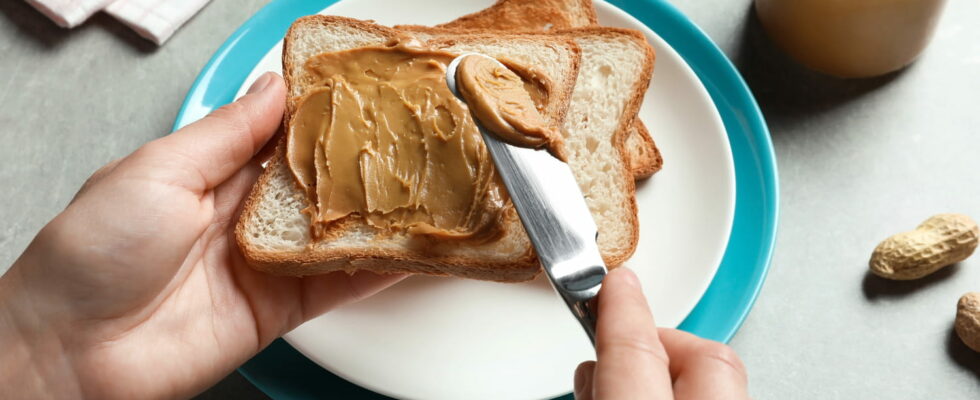Pay attention to its composition, insists our dietitian.
Gourmet, creamy and naturally protein-rich, the Peanut butter appears to be the “favorite” product of the moment, particularly among healthy and sports enthusiasts. On a banana, porridge, toast, pancakes or simply with a spoon. But is it such a healthy product? Can we eat it every day? And in what quantity?
Its name leaves little room for doubt… Peanut butter (or peanut butter among our American friends) is very caloric: there are 588 calories for 100 grams of product, knowing that a portion contains 117 calories, compared to 143 calories for the same quantity of classic butter (from cow’s milk) and 108 calories for the same quantity of Nutella©. From a purely caloric point of view, It may seem like a lot, but if you look closer, its composition is more interesting than butter or spreads. Per portion (pure peanut, without salt, sugar or oil), we count:
- 5 g of protein (the equivalent of a small hard-boiled egg)
- 2 g of fiber
- 7 g of lipids including monounsaturated fatty acids (omega-9) and polyunsaturated fatty acids (omega-3, omega-6).
It is therefore not a problem to consume peanut butter every day if this consumption is part of a varied and diversified diet. “The peanut remains an oilseed rich in omega 6, so despite its basic essential character, this fatty acid is often consumed in excess to the detriment of omega 3 and 9, so just regulate its consumption by varying other sources of fats, particularly rich in omega. 3 and 9 (such as olive, hazelnut, walnut, camelina or rapeseed oils)“, explains Amandine Berthaud, dietician-nutritionist and creator of the Instagram account Adietetic. Concretely, if you eat it in the morning for breakfast, you will make sure to put another oil in your vinaigrette at lunchtime.
“For its integration into the day, you can consume it at any time as long as it is at a time when you are digesting (within a meal and not snacking) and you do not have excess fat. fat on the meal because in terms of digestion, it can become difficult“, continues our interlocutor. It can be on pancakes, in muffins, instead of butter on bread, in a sauce with soy sauce or even as an accompaniment to fruit as part of a snack. example (on banana or apple slices).we would be on 10-15 g daily (2 rounded teaspoons or a large tablespoon) which would correspond to the recommended serving of oilseed fruits per day“, answers Amandine Berthaud. Like all excess fats, peanut butter can cause weight gain. For example, if a subject consumes between 50 and 60 grams each day, their weight will inevitably increase.
Also pay attention to the composition and quality of the peanut butter, prefer a 100% peanut product from controlled organic farming, without added sugar, without salt, without additives, “without palm oil or hydrogenated oil“, insists the expert. It is also possible to make it “at home” by mixing fresh, unsalted and unroasted peanuts using a blender or food processor.
